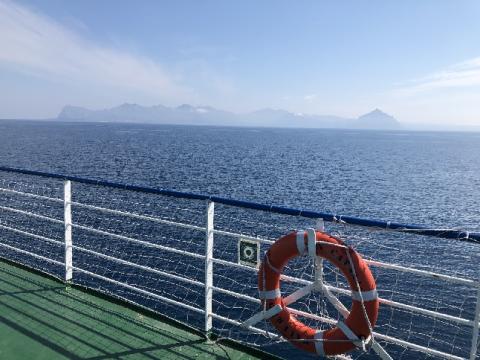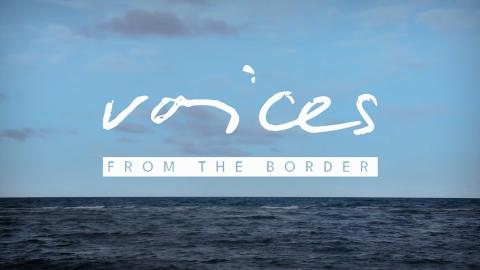
Get Insights
As the issue of migration becomes not only increasingly polarised, but also instrumentalized for political gain, the importance of fact-checking and contextualising the arguments that are commonly used in the media, political campaigns and around the dinner table is fundamental. Common myths include the belief that migrants overburden economies, increase crime rates or that Europe is facing an unprecedented migration crisis.
By presenting evidence-based analysis, this series aims to challenge such myths and offer a more nuanced understanding of migration. Through research- and data-driven discussions, borderline-europe seeks to foster informed dialogue and promote insights based on reality rather than misconceptions and stereotypes.
9. The EU’s “Success Story” Built on Numbers
In the first eight months of 2025, “irregular border crossings” fell by 23 % following a drop of 37% last year (European Commission, 2025).
European leaders, including Ursula von der Leyen, celebrate this drop as proof that the EU’s new migration partnerships - with Tunisia, Egypt, Mauritania and others - are “working.”
While irregular crossings have decreased, there is no clear statistical correlation between these numbers and the partnerships with third countries.
LET’S CHECK THE FACTS!
Definition
- At the heart of this celebration lies the EU’s Pact on Migration and Asylum, which promotes the externalization of border control via cooperation with third countries. Meaning, the transfer of the management of migration policy of the countries of origin and transit by the EU (ISS report 2023)
- E.g. MoU between Commission and Tunisia
- In practice, however, the EU’s claim of success rests on a narrow interpretation of numbers.
What The So-Called Success Erases: A Multidimensional Picture
- Causality is unclear: migration flows were already declining before the Pact on Migration and Asylum took effect. Weather, intensified policing, and shifting routes have played decisive roles (DGAP, 2025).
- Displacement effects: drops in arrivals to Europe often coincide with the rerouting of migrants toward countries such as Libya or Algeria, where human rights abuses are widespread (Friedrich Ebert Stiftung, 2024).
- Deaths and disappearances are excluded from most official statistics:
- 1,299 people have already died or gone missing in the Mediterranean Sea in 2025 (International Organization for Migration).
- Between 2014 and 2018, 12,000 drowned people were never found - a reminder of systematic undercounting (Statista).
- 2024 was the deadliest year ever recorded for migrants worldwide (International Organization for Migration, World Migration Report 2024).
How Ignorance is Produced
Migration statistics, or more generally statistics, are often selective by design:
- (A) They answer “How many?” and “Who?” - but not “At what cost?” (United Nations).
- (B) They classify flows (entries/exits) but ignore deaths, disappearances, and abuses.
- (C) This selective lens turns border violence into statistical silence
What Statistics Miss: Migration Drivers
According to the International Organization for Migration’s International Migration Drivers Report (IMD, 2018):
- Structural factors (economic conditions in origin countries, social networks, geographic proximity) have a far greater impact on migration flows than policies do.
- Migration is part of long-term demographic and economic processes - not just a short-term “emergency.”
This means that externalization policies have limited effects on the overall scale of migration, even if they shape routes and risks.
Conclusion:
Migration statistics are not neutral evidence. They are a politically framed resource that:
- legitimize symbolic policies, like return agreements and return policies
- erases border violence, abuses and death
- try to tackle structural drivers (war, inequality, climate, repression) that cannot be solved by fences.
This selective use of evidence translates into inefficiency. Even within the EU, the inefficiency is acknowledged. During a recent conference, Mauro Gagliardi (Member of the department for Migration and Home Affairs of the European Commission) admitted that current migration policies are largely symbolic, meant to reassure EU voters.
You don’t trust our numbers? Read for yourself that EU migration policies are not unqualified successes:
- DGAP (2025), Two Years In, the Impact of the EU-Tunisia Deal On Migration Is Overstated https://dgap.org/en/research/publications/two-years-impact-eu-tunisia-deal-migration-overstated
- Frontex (2025), Border crossing statistics. https://www.frontex.europa.eu/media-centre/news/news-release/eu-external-borders-irregular-crossings-down-21-in-the-first-8-months-of-2025-kABtQG
- International Organization for Migration (2024), World Migration Report. https://publications.iom.int/books/world-migration-report-2024
- Statista, Missing migrant data https://www.statista.com/statistics/1082077/deaths-of-migrants-in-the-mediterranean-sea/?srsltid=AfmBOoqktSn0tdGHXfB1rI1aak9oHMf7kEpWEsnXYgbwspft0FmRdLqC
- United Nations (2011), Practical Guide for Use and Production of Migration Data. https://unece.org/fileadmin/DAM/stats/publications/International_Migration_Practical_Guide_ENG.pdf
- IOM (2018), International Migration Drivers Report (IMD). https://ec.europa.eu/jrc
- Fakhry, A. (2023). More than borders: Effects of EU interventions on migration in the Sahel. Institute for Security Studies. http://www.jstor.org/stable/resrep63029
8. Is Germany’s border rejection of asylum seekers even compatible with the law?
Right after taking office, Germany’s new Interior Minister Alexander Dobrindt (CSU) began implementing one of the CDU’s central campaign promises: stricter border controls and – for the first time – pushbacks of asylum seekers at the border. Without changing any law, Interior Minister Dobrindt instructed the federal police to reject nearly all asylum seekers at the German border – with very limited exceptions for clearly vulnerable individuals. His goal: an "asylum turnaround" that effectively prevents people from applying for asylum in Germany.
But is this even legal? Or just another political signal at the expense of fundamental rights?
LET’S CHECK THE FACTS!
What does European law say?
According to the Dublin III Regulation, EU member states are required to determine which country is responsible for processing an asylum application. This assessment cannot happen instantaneously at the border. Therefore, pushbacks without individual procedures are not compatible with European law.
The possible loophole: Article 72 of the Treaty on the Functioning of the European Union (TFEU), which allows temporary derogations from EU law in the area of internal borders in the event of serious threats to public security. The minister argues in the media that rejections are necessary to prevent the asylum system from becoming overwhelmed and to respond to the shortcomings of the Dublin system.
Will this hold up in court?
Highly unlikely.
The European Court of Justice is expected to reject this interpretation. Here’s why:
– There is no exceptional situation. Asylum applications are actually decreasing across the EU
– Less drastic and legal alternatives exist to support local authorities
Conclusion:
The rejection of asylum seekers at Germany’s borders most likely violates European law – and the Minister knows it. Enforcing it anyway to make a political point is a deliberate breach of law at the expense of those seeking protection.
More information on the legal classification of rejections at the german borders can be found here:
Maximilian Amos: Migrationsrecht im Koalitionsvertrag: Grenzen dicht? (beck-aktuell, 16.04.2025)
7. Does migration lead to more crime?
Many politicians and political parties are calling for more migrants to be deported because they - wrongly - see migration as a threat to public safety.
They claim: People with a migrant background are more criminal than Germans due to their origin, and that immigration therefore increases crime rates. Less migration would therefore automatically lead to greater security and fewer crimes would be committed.
FALSE!
LET'S CHECK THE FACTS: Several studies show that …
- The statement “immigration leads to higher crime rates” is completely unfounded. Migrants make up far too small a proportion of the population to actually influence crime rates.
- Crimes that are committed by migrants receive up to 30 times more attention in the media than comparable crimes committed by people without a migration background. As a consequence, they are consistently overrepresented.
- Racist political rhetoric reinforces this false image and deliberately links migration to violence.
- External factors such as restrictive policies on residence permits are crucial when criminalizing migrants. It influences their percentage in the statistics through racial profiling, as crimes such as irregular border crossings can only be committed by migrants without regular documentation.
A passport therefore is not a useful criterion to determine whether someone is/will become a criminal, but rather restrictive and discriminatory laws. They make it difficult for migrants to access the labor market, drive them into precarious living conditions and thus increase the risk of exploitation and illegal activities as they have to find a way to survive.
What impact does this narrative have on people with a migrant background?
- It fuels hatred and racism against migrants. Newspapers and the media often focus on crimes committed by people with a migrant background. Its selective and intensive media coverage therefore reinforces this false perception. This distorted media portrayal is often accompanied by racist political rhetoric. Not only is this argument completely false, it also perpetuates dangerous stereotypes and prejudices.
- It leads to increasingly restrictive policies in relation to migrants. People with a migration background are overrepresented in prisons, but not because they are inherently more criminal. Nor do they lead to higher crime rates. Studies clearly show that more residence permits, work permits and stable employment opportunities significantly reduce crime rates among migrants. Inclusive policies and access to the labor market for vulnerable migrants can therefore make a significant difference when it comes to the proportion of crime rates among migrants.
- It allows policies to be based on prejudices rather than facts. An inclusive policy that gives vulnerable groups and asylum seekers access to the labor market can therefore effectively reduce crime. Nevertheless, many political decisions are based on prejudice rather than facts. Migration does not pose a threat to public safety. On the contrary, a fair and inclusive migration policy can promote economic growth and social cohesion if policies are done right.
You don't believe us? Read for yourself that migration and higher crime rates have nothing to do with each other:
- Alipour, J-V. et al. (2025). Steigert Migration die Kriminalitäts? Ein datenbasierter Blick. ifo Institut. Berlin.
- Marie, O. et al. (2024). Immigration and Crime: An International Perspective. Journal of Economic Perspectives.
- Bianchi, M. et al. (2012). Do Immigrants Cause Crime? Journal of the European Economic Association.
- The Economist (2024). What Spain can teach the rest of Europe.
- Spiegel (02.02.2025). Friedrich Merz fällt auf den Psychotrick der AfD herein.
6. Why do we differentiate between ‘regular’ and ‘irregular’ migration?
Politicians and the media often repeat that too many "irregular" migrants enter the EU.
They argue: The fight against “IRREGULAR” migration is the most important task. Giorgia Meloni says: "illegal migrants are the enemies of legal ones (...) We have not been able to allow many legal migrants to come to Italy in recent years because we have had too many illegal ones."
But is the problem really “irregular” migration, or the laws & Media that label it as such?
LET'S CHECK THE FACTS!
What does "regular Migration" even mean?
The eu defines migration as “regular” if the person trying to enter a country either holds a valid visa, a passport that allows for a visa-free entry (currently applying to 60+ non-eu states) or benefits from freedom of movement in the EU. If none of these three conditions apply, the person is considered an "irregular" migrant. Refugees and migrants without a visa, the right passport, or EU freedom of movement have no legal entry pathway. Fleeing war or persecution often makes it impossible to obtain these documents in advance. However: once a person applies for asylum they are regarded as a “regular” migrant with a preliminary residence permit. This highlights the paradox, considering the obstacles to even apply for asylum.
“Irregular” migration does not only describe “irregular entry” but also an “irregular” stay. People overstaying their visas, rejected asylum seekers, or those with a residence permit losing their employment, etc. are all considered “irregular” and are at risk of deportation and further illegalization. Regardless of how people are pushed into “irregularity,” illegalized migrants are deprived of their rights and dignity.
What are the consequences of the myth of the “irregular migrants”?
- Legal uncertainty: being excluded from healthcare and avoiding seeking help due to fear of deportation. this results in the deprivation of basic human rights.
- Cannot work legally: pushing people into precarious situations and exploitative jobs. this results in low wages, poor conditions, and dependency on their employers.
- In order to battle the so-called “irregular” migration, the eu and governments worldwide are implementing stricter border controls or migration policies.
- “Irregular” migration policies focus on restriction rather than recognising the human realities. they don’t stop movement but push people into danger, forcing them into riskier routes and increasing human trafficking. additionally, a hierarchy of discrimination is created.
- Migration has always been part of the human world, and rigid categories fail to capture its complexity.
- The common european asylum system (ceas), border externalizations, illegal pushbacks, and the thousands of deaths in the mediterranean are all examples and consequences of this discriminatory view on migration.
Don’t belive us? Read for yourself that irregular migrants should not be illegal:
- Netzwerk Fluchtmigration. (February 2025). Fluchtforschungsblog, Forschung gegen Mythen 9. Hamburg.
- Ghelli, F. (January 2025). Grenzkontrollen führen nicht zu weniger Fluchtmigration. Mediendienst Integration. Berlin.
- Hasselmann, D. (February 2025). Was sind irreguläre Einreisen? Mediendienst Integration. Berlin.
- Mediendienst Integration. Leben ohne Papiere: Illegalisierte Migranten. Berlin.
- Triandafyllidou, A. (March 2023). Irregular migration and migration control policies. In *Research Handbook on Irregular Migration.
5. Does Europe actually host that many migrants?
Politicians and media want to make us believe that ‘Europe is overrun by migrants’.
They argue: The EU does outstanding work in accomodating so many migrants. Other nations do not help those seeking asylum. It is unfair that the EU should deal with these numbers of migrant arrivals alone.
LET’S CHECK THE FACTS!
The claim that Europe takes in the majority of global migration movements does not hold up under scrutiny. According to recent statistics from the EU and UNHCR, 69% of forcibly displaced people—equivalent to 43.7 million people as of mid-2024—remain in neighboring countries. Only a small fraction of those forced to migrate actually reach Europe: in 2023, just 6% of the EU population were non-EU citizens. These numbers clearly show that the majority of migration is handled by regions outside of Europe.
What Are the Consequences of the Myth of a “never-ending migration stream”?
- Denial of reasons to flee & overestimation of fortress Europe: The legitimate reasons for flight and migration are often ignored. No one leaves their home, family, language, and belongings behind lightly. Rather, it is armed conflicts, economic decline caused by decades of exploitation, and the loss of living spaces due to climate change that force people to flee. For many, the EU is not primarily a dream destination but their last hope for safety and a dignified life.
- Role of international community downplayed: In reality, neighboring countries in conflict regions, as well as states struggling with economic instability and extreme weather events, bear the greatest burden of taking in migrants.
- Number of arrivals overestimated: Compared to the global distribution of migrants, Europeans perceive the burden as much greater than it actually is. Driven by concerns about their wealth, many fear that migration could jeopardize their economic stability.
Don’t belive us? Read for yourself that Europe does not bear the main burden of migration:
- UNHCR, Division of Statistics, Data Science, and Surveys (2024): Global Trends. Forced Displacement in 2023.
- UNHCR, Division of Statistics, Data Science, and Surveys (2024): Mid-Year Trends 2024.
- Eurostat (2024): Migration and Asylum in Europe.
- International Organization for Migration (2024): World Migration Report 2024. McAuliffe, M., & L.A. Oucho (Eds.).
4. Does migration fuel terrorism?
In the wake of recent terrorist attacks, some are calling for deportations of migrants or stricter immigration policies..
This is how they feel: They see immigration as a security risk and believe it could increase the chance of terrorism.
LET’S CHECK THE FACTS!
There is little evidence that more migration leads to more terrorism, especially in Western countries. Although some attacks are carried out by first, second or third generation immigrants, this correlation is insignificant compared to the total number of immigrants. Stricter migration rules don’t stop terrorism, but terrorist attacks often cause stricter migration policies and fuel anti-immigrant feelings.
Where are these demands coming from?
- Terrorist Attacks Undermine Security: Such acts threaten our fundamental need for safety, often targeting liberal democracies and their values of freedom and peace.
- Loss of Security Feeling: After an attack, many people feel less safe and may support irrational political measures to regain a sense of security.
Politicians can easily misuse people’s fear to gain support for ideological motivated or populist measures, even if they have no proven effect.
Don’t belive us? Read for yourself that migration does not fuel terrorism:
- Helbling, M., & Meierrieks, D. (2022). Terrorism and Migration: An Overview.
- Observatory on Radicalisation and Counter-Terrorism (2021). Report on Terrorism and Radicalization in Europe - N. 2, Year 2.
3. Why do people flee countries where I can have a great holiday?
We regularly hear people and the media claiming that, if a country is safe for a great holiday, it must also be safe to live in.
And that's what they mean: People who claim asylum while fleeing a country that we consider a holiday destination have no legitimate reason to flee!
LET’S CHECK THE FACTS!
FALSE: Because when we visit stunning beaches or picturesque towns, we often see only the beauty and adventure. But for many locals, the reality is far more complex. The safety of tourists often depends on privileges (resorts, security, protected zones) that locals don't have access to. Vulnerable groups (activists, minorities, LGBTQ+...) are often at risk. Tourists can leave a country at any time. For locals the situation is different: no legal way out or into another state.
What’s the impact of the ongoing ‘safe country’ debates?
- Discouraging Asylum Seekers from 'Safe' Countries: Authorities deter individuals from designated 'safe' nations from seeking protection.
- Violating International Law: Deporting individuals to countries where they risk persecution or torture contravenes international legal obligations.
- Expanding 'Safe Country' Lists: More countries are labeled as 'safe' to expedite deportations, overlooking individual risks.
- Implementing Stricter Deportation Measures: Authorities adopt faster procedures, broaden definitions of criminality, and enforce stricter detention conditions before deportation.
- Trivializing Political Situations: Privileged tourists romanticize their travels, downplaying serious political issues that don't directly affect them.
These actions are contributing to a growing negative attitude towards migration.
Don’t belive us? Read for yourself why safe countries are not safe for all:
- Morlotti, S. (2024). Safe or Not? Some Much-Awaited Clarification on the Designation of Safe Third Countries of Origin by the CJEU SARA MORLOTTI. [online] Available at: https://rivista.eurojus.it/wp-content/uploads/pdf/Safe-or-Not-1.pdf [Accessed 30 Jan. 2025].
-
Euromed Rights, Fidh and Aedh (2016). ‘Safe’ countries: A denial of the right of asylum. [online] Available at: https://euromedrights.org/wp-content/uploads/2016/10/AnalysePaysSurs-FINAL-EN-12052016_final.pdf
-
Timothy, D.J. (2002). Tourism and Political Boundaries. [online] Routledge. doi:https://doi.org/10.4324/9780203214480.
2. Are migrants a burden on the social system?
We regularly hear politicians and the media claiming that migrants are a burden on the on the social system.
And that’s what they mean: Migrants exploit our welfare systems and do not contribute to the economic success of a country.
LET’S CHECK THE FACTS!
False: Because studies show that migration brings economic benefits, not burdens. Expenses emerge only temporarily in the arrival phase. Once integrated into the labor market, migrants contribute more than they receive. In countries with declining birth rates, migrants are essential to a strong labor force.
What’s the impact of ongoing welfare debates?
- Stigma and Racism: Migrants and refugees are unfairly labeled as 'lazy' or 'unskilled,' leading to negative stereotypes.
- Disregarding International Obligations: Politicians overlook legal duties to justify stricter asylum policies.
- Restrictive Policies and Generalized Suspicion: Access to financial assistance is limited by introducing special payment cards for refugees, fostering mistrust.
- Denial of Reasons for Flight or Migration: Legitimate reasons for fleeing are dismissed, with individuals wrongly accused of exploiting social welfare.
These actions are contributing to a growing negative attitude towards migration.
Don’t belive us? Read for yourself that studies show there migrants don’t burden the social system:
- Oxford University (2019): No evidence of a "magnet effect" as a pull factor to migrate to the most generous welfare states.
- BPB (2021): "The faster new immigrants find employment that matches their skill level, the more positive the fiscal impact."
- IZA World of Work (2014): "Contrary to the welfare magnet hypothesis, empirical evidence suggests that immigration decisions are not made on the basis of the relative generosity of the host country's social benefits."
- SAIS Europe Journal of Global Affairs (2022): "Refugees are not a fiscal burden".
1. Is there a pull-effect from NGO boats?
We regularly hear from politicians and media about the "pull effect" from NGO boats in the Mediterranean.
And that's what they mean: NGO rescue boats in the Mediterranean encourage migrants to start their journey, because they know they'll be rescued.
LET’S CHECK THE FACTS!
FALSE: Because there is no pull-effect from NGO boats! This has been proven many times.
Rather: There are many reasons why people flee, including persecution, climate change, instability, discrimination, lack of opportunity, war, poverty, family reunification ...
What effects do the debates about the pull-effects have?
- Rescuers Treated as Criminals: People saving lives at sea are facing legal charges and their missions are being blocked.
- Funding Cuts: Financial support for sea rescue operations is being reduced.
- Ignoring Legal Duties: The obligation to rescue people at sea, as required by international law, is being neglected.
- Overlooking Reasons for Migration: The valid reasons why people flee their countries are being dismissed.
- Underestimating the Danger: The deadly risks of crossing the Mediterranean are being downplayed.
These actions are contributing to a growing negative attitude towards migration.
Don’t belive us? Read for yourself that studies show there is no pull-effect:
- Norwegian Refugee Council (2016): No evidence of a pull effect from sea rescues; people don't know if rescues will take place.
- University of Oxford (2017): Push factors such as war and poverty drive migration.
- Migration Policy Institute (2017): Analysis shows no 'pull' effect.
- EU EASO Report (2018): No correlation between rescue intensity and refugee numbers; war and poverty are key.
- Frontex (2019): No clear effect; push factors in countries of origin are significant.
- University of Trier (2020): "Pull effect is based on wrong assumptions; other factors play a role.
The discussion remains politically controversial - even in election campaigns; sea rescues are often used as a scapegoat, obscuring more complex migration issues.





